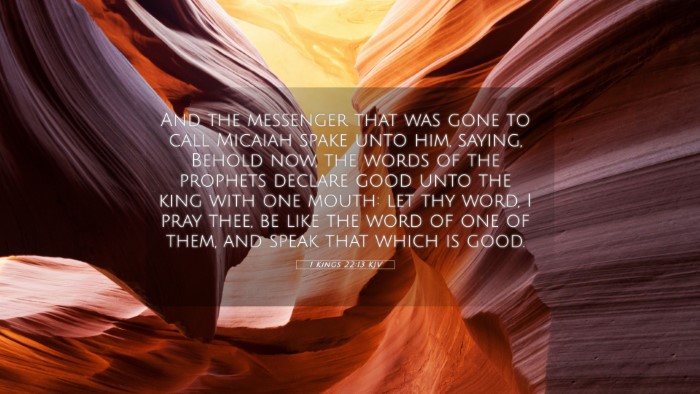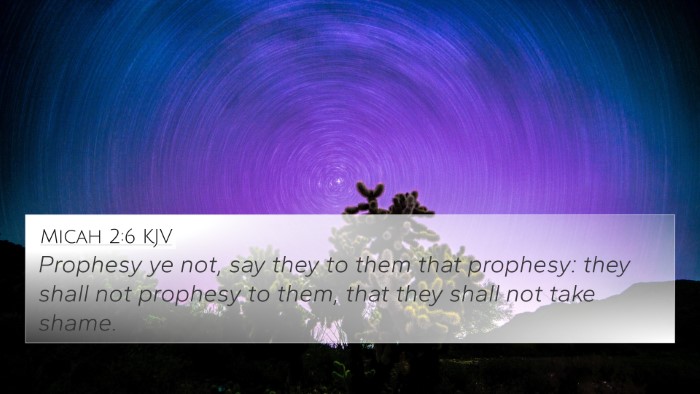Bible Verse Meaning: 1 Kings 22:13
1 Kings 22:13 reads: "And the messenger that was gone to call Micaiah spake unto him, saying, Behold now, the words of the prophets declare good unto the king with one mouth: let thy word, I pray thee, be like the word of one of them, and speak that which is good."
Summary of the Verse
This verse captures a pivotal moment when a messenger is sent to summon the prophet Micaiah. The messenger attempts to influence Micaiah's words to align with the favorable prophecies of other prophets, showcasing a theme of conformity to popular opinion.
Verse Meaning According to Commentaries
According to Albert Barnes, the messenger's request reflects a broader pressure in society to conform to prevailing narratives, even when they may not represent the truth. This moment illustrates the conflict between true prophecy and the allure of pleasing, yet inaccurate, messages.
Matthew Henry highlights that the messenger was aware of the unity of the other prophets but sought to undermine Micaiah's independence and prophetic integrity. This shows a historical tendency for leaders and influencers to desire validation from those who will speak in their favor.
Adam Clarke adds that the call to Micaiah is emblematic of the fear of confrontation with truth, often resulting in counsels of compromise rather than courage. Clarke stresses that true prophets must often stand alone against popular consensus, indicating the burdens that come with prophetic calling.
Connections to Other Bible Verses
- 1 Kings 22:6: Reflects the initial gathering of prophets and their agreement.
- Jeremiah 23:16: Warns against false prophets who speak peace when there is no peace.
- Romans 12:2: Encourages believers to resist conformity to the world and to seek God’s will.
- Micaiah's prophecy (1 Kings 22:17): The true message delivered by Micaiah, contrasting the false assurances by other prophets.
- 2 Chronicles 18:12-14: A parallel account that shows Micaiah's eventual confrontation with the other prophets and the king.
- Acts 5:29: A reminder of the principle that we must obey God rather than men, resonating with Micaiah’s stand.
- Proverbs 29:25: The fear of man lays a snare, relevant to the temptation for Micaiah to conform for acceptance.
- Matthew 7:15: Jesus warns of false prophets, paralleling Micaiah’s situation as he encounters deceitful predictors.
- 1 Thessalonians 2:4: Highlights the need for bold proclamation of the Gospel in contrast to popular opinion.
- Revelation 19:10: The spirit of prophecy which should not be compromised for human approval.
Thematic Bible Verse Connections
This verse emphasizes several themes that permeate the scriptures:
- The Integrity of Prophecy: The struggle of true messengers of God against the pressures of conformity.
- Courage vs. Cowardice: The moral choice between speaking the truth and succumbing to the desire for acceptance.
- The Consequences of False Assurance: The peril of reliance on inaccurate declarations that lead to poor decisions.
- Divine Authority vs. Human Authority: The ongoing struggle throughout the scriptures where divine messages confront societal norms.
Interpretative Insights
In light of cross-referencing Biblical texts, the themes of this scripture prompt deeper reflection on the nature of truth in one’s spiritual walk. This encourages individuals to engage in a comparative Bible verse analysis to fully understand the implications of standing firm in one’s faith amidst societal pressures.
The narrative around Micaiah illustrates how challenging it can be to uphold truth and fidelity to God’s word, serving as an essential lesson for modern believers on maintaining their values despite external influences.
Tools for Bible Cross-Referencing
- Comprehensive Bible concordances can help locate verses related to themes of prophecy and integrity.
- Bible reference resources aid in discovering deeper meanings behind connections between verses.
- Utilizing a cross-reference Bible study can facilitate understanding the broader dialogue between Testaments.
- Employing a Bible cross-reference guide encourages exploration of thematic linkages.
Conclusion
The emotional gravity of 1 Kings 22:13 resonates throughout biblical history and modern application, inviting believers to recognize the significance of their words and the courage required to stand for truth. Engaging with tools for Bible cross-referencing enriches this understanding and empowers Christians in their spiritual journey.












